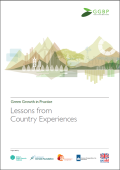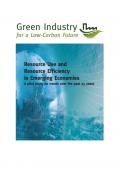
Renewable energy together with energy efficiency, sustainable transport, sustainable agriculture, sustainable tourism, green building and waste management are economic sectors which are often considered capable of paving the way for a transition to a green economy and providing win-win solutions offering job creation, poverty alleviation and environmental protection. However, there are a number of obstacles and challenges that might inhibit these sectors in their contribution towards greening the economy. These include limited knowledge and awareness relevant to green economy and green jobs, gaps in policy and regulations, limited financial incentives to support green initiatives, and related awareness and skill shortages.
This report seeks to provide practitioners with the tools and information needed to respond to the public expenditure policy and management challenges arising from climate change. It is a series of notes and supporting materials written as a first step towards consolidating current research and international experience, identifying emerging practice and providing practical and applicable guidance for staff of central finance agencies, development agencies, environmental agencies and other international organizations working on climate change issues. In addition to emphasizing the importance of strengthening national systems throughout, the Sourcebook focuses on the specific public expenditure policy and management challenges posed by climate change, such as decision-making in the face of uncertain future climate conditions, expenditure planning for extreme weather and climate events, the lack of agreed budget definition and classification of climate change activities.

Green growth is becoming an attractive opportunity for countries around the world to achieve poverty reduction, environmental protection, resource efficiency and economic growth in an integrated way. Green growth strategies generate policies and programs that deliver these goals simultaneously. They accelerate investment in resource efficient technologies and new industries, while managing costs and risks to domestic taxpayers, businesses, communities and consumers.
This report carried out by the Green Growth Best Practice (GGBP) initiative, is the first comprehensive international assessment of lessons from experiences of pursuing green growth across all levels of government and all regions. The report is the result of a collaborative partnership between the Climate & Development Knowledge Network (CDKN), the European Climate Foundation (ECF) and the Global Green Growth Institute (GGGI). It engaged 75 authors in evaluating more than 60 programs around the world.

This report examines patterns and trends in resource use and resource efficiency in 16 selected emerging economies between 1985 and 2005. In order to facilitate comparison, the authors divided these countries into three different groups according to their dominant strategy of economic development since 1985: resource-based economies with a high ratio of raw materials in exports, including Algeria, Argentina, Brazil, Chile, Morocco, Russia and South Africa; industry-based economies which have been expanding their capacity to produce manufactured goods and related services, including China, Costa Rica, Malaysia, Mexico and the Republic of Korea; and services-based economies that have largely based their development since 1985 on services (e.g. tourism, financial or knowledge-based industries), including Barbados, Egypt, India and the Seychelles. While none of these three development paths is exclusive, they are useful categories for analytical purposes, as each is linked to specific physical or material profiles in terms of resource use and resource productivity.
This report aims at providing the emerging lessons from a representative sample of case studies in 20 developing countries that could help policy makers to address implementation challenges, including overcoming political economy and affordability constraints. The sample has selected on the basis of a number of criteria, including the country's level of development (and consumption), developing country region, energy security and the fuel it subsidies (petroleum fuel, electricity, natural gas).
